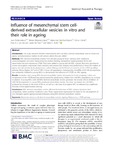Mostrar o rexistro simple do ítem
Influence of mesenchymal stem cell-derived extracellular vesicles in vitro and their tole in ageing
| dc.contributor.author | Fafián Labora, Juan Antonio | |
| dc.contributor.author | Morente-López, Miriam | |
| dc.contributor.author | Sánchez-Dopico, María José | |
| dc.contributor.author | Arntz, O.J. | |
| dc.contributor.author | Van de Loo, F.J. | |
| dc.contributor.author | De-Toro, Javier | |
| dc.contributor.author | Arufe, M.C. | |
| dc.date.accessioned | 2020-01-29T10:07:05Z | |
| dc.date.available | 2020-01-29T10:07:05Z | |
| dc.date.issued | 2020-01-03 | |
| dc.identifier.citation | Fafián-Labora J, Morente-López M, Sánchez-Dopico M.J. et al. Influence of mesenchymal stem cell-derived extracellular vesicles in vitro and their tole in ageing. Stem Cell Res Ther. 2020; 11:13 | es_ES |
| dc.identifier.issn | 1757-6512 | |
| dc.identifier.uri | http://hdl.handle.net/2183/24783 | |
| dc.description.abstract | [Abstract] Introduction: This study assessed whether mesenchymal stem cell (MSC)-derived extracellular vesicles influenced ageing and pluripotency markers in cell cultures where they are added. Methods: MSC-derived extracellular vesicles from old and young rat bone marrows were isolated by ultracentrifugation and were characterised by western blotting, nanoparticle tracking analysis (NTA) and transmission electron microscopy (TEM). They were added to young and old MSC cultures. Real-time quantitative reverse transcription polymerase chain reactions and western blot analysis were performed to check the markers of ageing (vinculin and lamin A), pluripotency markers (Nanog and Oct4) and components of the mTOR signalling pathway (Rictor, Raptor, AKT and mTOR) in these cell populations. Subsequently, microRNA (miR)-188-3p expression was transiently inhibited in young MSCs to demonstrate the influence of mTOR2 on MSC ageing. Results: Incubation with young MSC-derived extracellular vesicles decreased the levels of ageing markers and components of the mTOR pathway and increased the pluripotency markers from old MSC populations. By contrast, incubation of young MSCs with old MSC-derived extracellular vesicles generated the reverse effects. Inhibition of miR-188-3p expression in young MSCs produced extracellular vesicles that when incubated with old MSCs produced an increase in the levels of Rictor, as well as a decrease of phosphor-AKT, as indicated by a significant decrease in beta-galactosidase staining. Conclusions: MSC-derived extracellular vesicles affected the behaviour of MSC cultures, based on their composition, which could be modified in vitro. These experiments represented the basis for the development of new therapies against ageing-associated diseases using MSC-derived extracellular vesicles. | es_ES |
| dc.language.iso | eng | es_ES |
| dc.publisher | Springer Nature | es_ES |
| dc.relation.uri | https://doi.org/10.1186/s13287-019-1534-0 | es_ES |
| dc.rights | Creative Commons Attribution 4.0 International License (CC-BY 4.0) | es_ES |
| dc.rights.uri | http://creativecommons.org/licenses/by/4.0/ | * |
| dc.subject | Mesenchymal stem cell-derived extracellular vesicles | es_ES |
| dc.subject | Ageing | es_ES |
| dc.subject | Pluripotency | es_ES |
| dc.subject | mTOR pathway | es_ES |
| dc.title | Influence of mesenchymal stem cell-derived extracellular vesicles in vitro and their tole in ageing | es_ES |
| dc.type | info:eu-repo/semantics/article | es_ES |
| dc.rights.access | info:eu-repo/semantics/openAccess | es_ES |
| UDC.journalTitle | Stem Cell Research & Therapy | es_ES |
| UDC.volume | 11 | es_ES |
| UDC.startPage | 13 | es_ES |
| dc.identifier.doi | 10.1186/s13287-019-1534-0 |
Ficheiros no ítem
Este ítem aparece na(s) seguinte(s) colección(s)
-
INIBIC-TCMR - Artigos [102]
-
GI-TCMR - Artigos [131]







